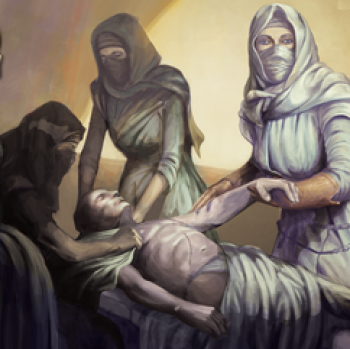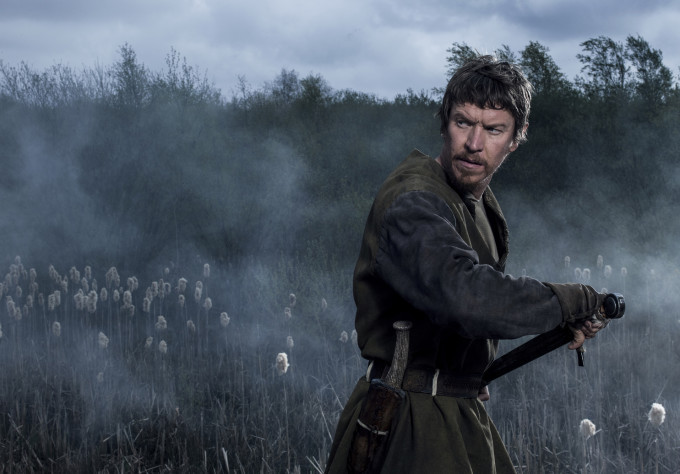
"They say the spring was bad in Lannisport and worse in Oldtown, but in King’s Landing it cut down four of ten. Neither young nor old were spared, nor rich nor poor, nor great nor humble. Our good High Septon was taken, the gods’ own voice on earth, with a third of the Most Devout and near all our silent sisters. His Grace King Daeron, sweet Matarys and bold Valarr, the Hand… oh, it was a dreadful time. By the end, half the city was praying to the Stranger."
I N T R O
It has long been thought that the winters of Westeros are the most damning aspect of life across the continent. Their cold sinks deep into the land, the frost taking with it all but the hardiest of crops. It lasts for years at a time, children born and dying without ever knowing the kiss of summer and the sweetness of warmer times. Spring is normally a great joy because of this. Festivals are planned as soon as the Citadel's archmaesters announce its pending arrival, plowmen eagerly return to their fields to sow food for their wives and kin, and the great houses of the kingdoms sally from their castles to break bread with friends and rivals alike, to forge new relationships and mend old wounds in the season of rebirth.
The year 209 was not so kind as to deliver this kind of spring. Nobody truly knows where the plague began. The pious would claim it a punishment from the Gods themselves, whilst learned men speculate the malady came upon the shores by the trade winds and the foreigners who sailed on them. It mattered not the origin, though. The Great Spring Sickness, as it was so aptly named, spread through the kingdoms like wild fire. Through villages and hold fasts, through castles and fortresses all the same the pestilence claimed both high and lowborn alike. Strong men would wake fine in the morning and be ferried into shallow graves by nightfall so quick was it to act. It ravaged the countryside badly, but nowhere was it worse than the cities; Lannisport, Oldtown and King's Landing most of all saw swathes of men, women and children rot away in the streets as the year dragged on.
By the time the year closed and the sickness abated with it, Westeros was in disarray. Tens of thousands of small folk lay dead, houses lost lords and lordlings alike, with boys young as five forced onto thrones with the deaths of their fathers. In the capital, four in every ten had succumb and the meddling of pyromancers burning bodies by the hundreds set a fourth of the city ablaze. Not even the great dragons who sat the Iron Throne were spared the chaos. Good King Daeron, his Hand of the King Valarr and dear grandson Matarys fell ill and perished within the Red Keep by spring's end. His second son, Aerys, a spindly scholar with more interest in reading than ruling ascended the throne soon after. Only the Vale of Arryn and Dorne survived unscathed, sealing mountainous borders and awaiting the blight to pass.
Yet, when crisis on such a scale occurs, rarely does it slink away with a whimper. Not fourteen years prior, half of Westeros rose with the black dragon Daemon Blackfyre and sought to overthrow his brother Daeron. The rebellion cut lines deep into the unity of the kingdoms, fighting consuming Westeros until the Battle of Redgrass Field, named for the blood that stained the very ground in its wake, put an end to the conflict. Thousands perished, among them Daemon himself, his sons Aegon and Aemon and his half-brother, Brynden the Bloodraven.
Many of those who rebelled and lived to tell the tale took to exile with the sons of their king and his most ardent supporter, Aegor Bittersteel. Those who remained lost lands, titles, wealth and forfeit heirs and children as hostages to the throne. The sickness saw fit to claim these hostages too, leaving houses slighted by the throne with nothing to stop their schemes. With a weak king upon the throne, some whisper worrisome words; that the time for war is again. That the black dragon shall rise a second time.
To the west, the Ironborn fly their banners and take to the seas. The Lord Reaper of Pyke sets longships across the coasts of the mainland, raiding the Sunset Sea with impunity as King Aerys carefully affixes his gaze across the sea. The ironmen grow bolder by the day, and it is only a matter of time before the kraken rises up with its full strength and crashes against Westeros' shores looking for blood and gold among its weakened lords and frightened peasantry.
To the south, a man wears the crown of the Vulture King, playing upon the nostalgic and greedy with promises to raid the marches as their ancestors once did, with thousands flocking to his roost among the Boneway and forging their outlaw kingdom within the Red Mountains. Further north, word from beyond the wall claims a raider with a horn of legend names himself King, and with him the wildlings willingly stride southwards in growing number.
The year is now 211 AC. The realm simmers with conflict just beneath its surface, as nobility finally treat one another and the summer sun rises high above the Seven Kingdoms. Schemes and plays for power and prestige run amok among the highest echelons of society, and with them comes the question asked so often when lords play their game of thrones — how badly will Westeros bleed this time?
The year 209 was not so kind as to deliver this kind of spring. Nobody truly knows where the plague began. The pious would claim it a punishment from the Gods themselves, whilst learned men speculate the malady came upon the shores by the trade winds and the foreigners who sailed on them. It mattered not the origin, though. The Great Spring Sickness, as it was so aptly named, spread through the kingdoms like wild fire. Through villages and hold fasts, through castles and fortresses all the same the pestilence claimed both high and lowborn alike. Strong men would wake fine in the morning and be ferried into shallow graves by nightfall so quick was it to act. It ravaged the countryside badly, but nowhere was it worse than the cities; Lannisport, Oldtown and King's Landing most of all saw swathes of men, women and children rot away in the streets as the year dragged on.
By the time the year closed and the sickness abated with it, Westeros was in disarray. Tens of thousands of small folk lay dead, houses lost lords and lordlings alike, with boys young as five forced onto thrones with the deaths of their fathers. In the capital, four in every ten had succumb and the meddling of pyromancers burning bodies by the hundreds set a fourth of the city ablaze. Not even the great dragons who sat the Iron Throne were spared the chaos. Good King Daeron, his Hand of the King Valarr and dear grandson Matarys fell ill and perished within the Red Keep by spring's end. His second son, Aerys, a spindly scholar with more interest in reading than ruling ascended the throne soon after. Only the Vale of Arryn and Dorne survived unscathed, sealing mountainous borders and awaiting the blight to pass.
Yet, when crisis on such a scale occurs, rarely does it slink away with a whimper. Not fourteen years prior, half of Westeros rose with the black dragon Daemon Blackfyre and sought to overthrow his brother Daeron. The rebellion cut lines deep into the unity of the kingdoms, fighting consuming Westeros until the Battle of Redgrass Field, named for the blood that stained the very ground in its wake, put an end to the conflict. Thousands perished, among them Daemon himself, his sons Aegon and Aemon and his half-brother, Brynden the Bloodraven.
Many of those who rebelled and lived to tell the tale took to exile with the sons of their king and his most ardent supporter, Aegor Bittersteel. Those who remained lost lands, titles, wealth and forfeit heirs and children as hostages to the throne. The sickness saw fit to claim these hostages too, leaving houses slighted by the throne with nothing to stop their schemes. With a weak king upon the throne, some whisper worrisome words; that the time for war is again. That the black dragon shall rise a second time.
To the west, the Ironborn fly their banners and take to the seas. The Lord Reaper of Pyke sets longships across the coasts of the mainland, raiding the Sunset Sea with impunity as King Aerys carefully affixes his gaze across the sea. The ironmen grow bolder by the day, and it is only a matter of time before the kraken rises up with its full strength and crashes against Westeros' shores looking for blood and gold among its weakened lords and frightened peasantry.
To the south, a man wears the crown of the Vulture King, playing upon the nostalgic and greedy with promises to raid the marches as their ancestors once did, with thousands flocking to his roost among the Boneway and forging their outlaw kingdom within the Red Mountains. Further north, word from beyond the wall claims a raider with a horn of legend names himself King, and with him the wildlings willingly stride southwards in growing number.
The year is now 211 AC. The realm simmers with conflict just beneath its surface, as nobility finally treat one another and the summer sun rises high above the Seven Kingdoms. Schemes and plays for power and prestige run amok among the highest echelons of society, and with them comes the question asked so often when lords play their game of thrones — how badly will Westeros bleed this time?
P R E M I S E
This roleplay is shall take place in an alternate universe, branching off the main storyline of Asoiaf during the First Blackfyre Rebellion and leading into the Great Spring Sickness some fifteen years later. Players will take the role of either individual characters, or whole houses within Westeros as the kingdoms are assailed by danger from all sides, collaborating or competing to fulfill their ambitions whilst chaos consumes the terse peace. As this roleplay will be very sandbox in nature, with each player taking hold of and directing their own storylines with minimal GM meddling, I ask that those who express interest be prepared to be the driving forces behind their plots, and assume the initiative both ICly and OOCly.
R U L E S
- A Song of Ice and Fire is a franchise which features some fairly mature content. As such, I expect the players to behave as adults. Please keep it civil.
- In the event of conflicts arising, working out a compromise in private is encouraged, but I will step in if no decision can be reached.
- We’ll be writing in reasonably advanced standards for casual around here, which is to say, posts with fairly solid grammar, spelling and punctuation. I want to see depth and emotion in the posts. While I'll not impose any hard requirements for posts, I'd truly like a consistent 3 paragraphs. Bring the world to life!
- While this will remain freeform, I'd like there to be a semblance of order.
- Allow other players to post between your own interactions, with drawn out exchanges taking place over Titanpad to prevent back-and-forth posting from cluttering the IC.


